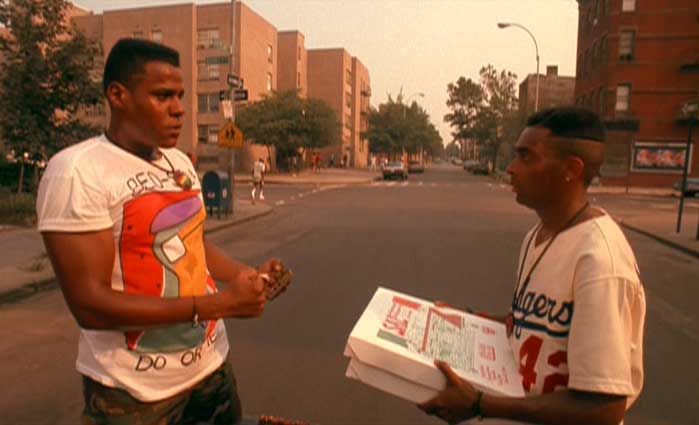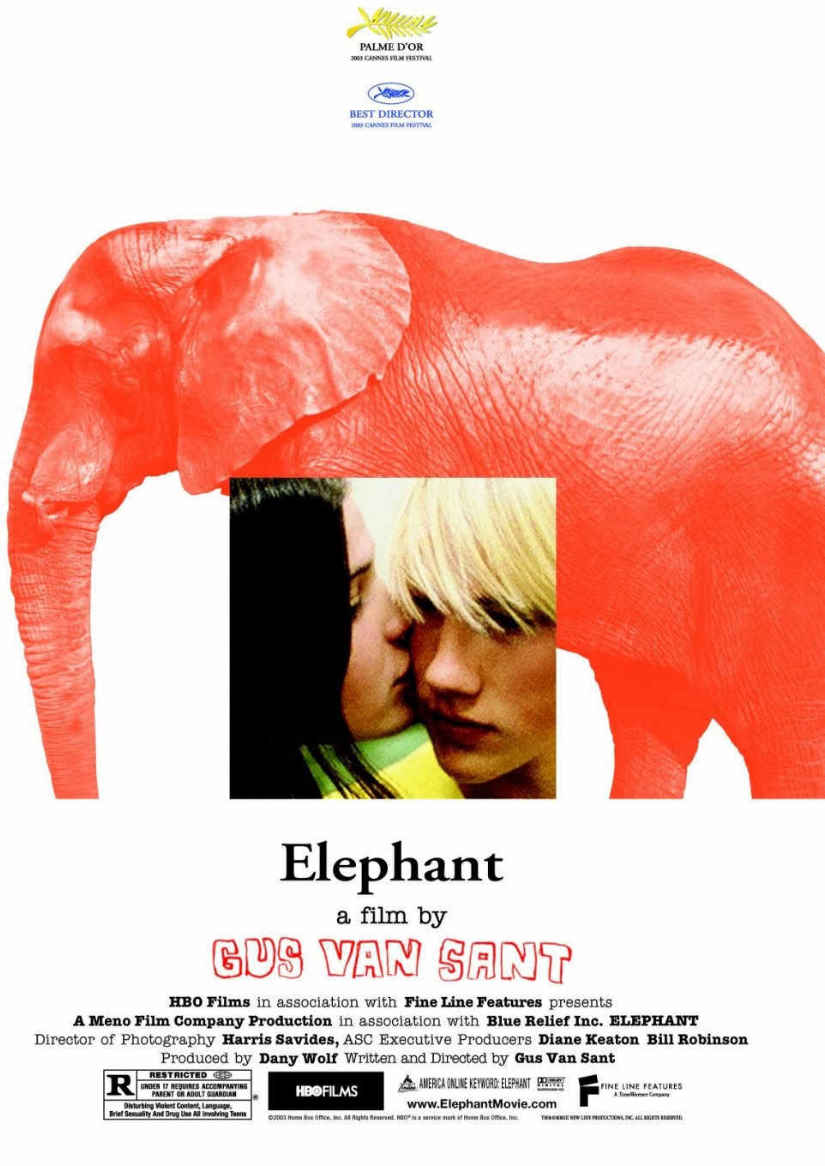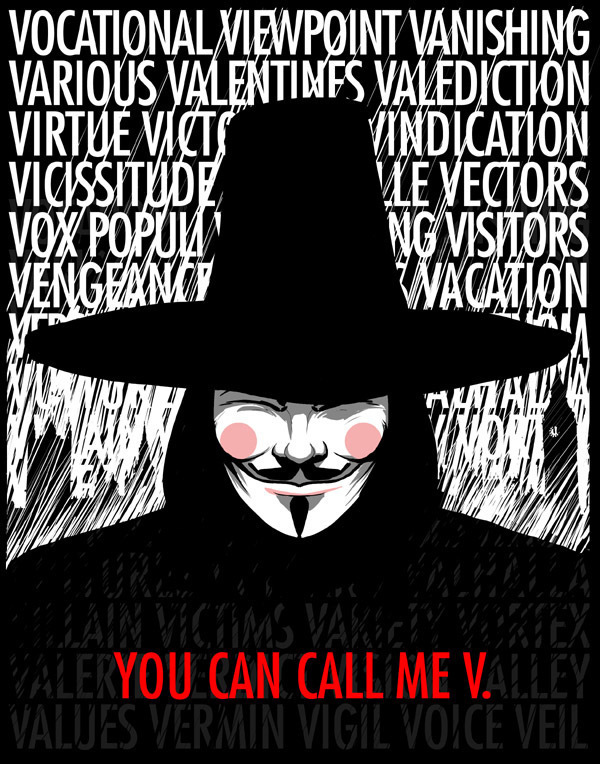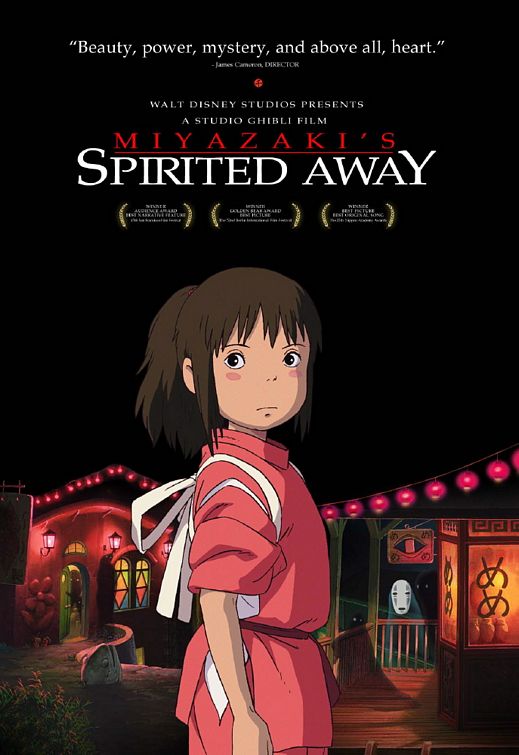
I saw this movie when it first came out in 2006 and at that time I wasn't prepared to make religious decisions for myself so I was just offend that a negative light was shone upon Christianity because after all I am basically a Christian. But in my second viewing of this film I found myself irate and frustrated. As I watched this documentary all I could think about was: my children will never ever be like this. I never want to force my children into something so forcefully. I do not want them to see religion as this epic dividing factor that can essentially destroy nations and start wars. It bothered me that these Evangelicals thought that everything they spoke was the complete and utter truth. They were so ignorant. Or rather they were portrayed in such a painfully ignorant light (but the "potential" bias of this film is a whole other story). They seemed very obsessed with this idea of church and state melding perfectly into one. But perhaps they don't see that so many other religions have that same right to push their religion onto the government and in turn carry tremendous weight when it comes to national decisions. There were so many actions these people took that made me detest organized religion. From what I know it is supposed to be more about your "personal" relationship with God.

I am all for freedom of expression and I would never condemn these individuals for practicing a religion they put so much faith and passion into, so it is perhaps more the way this movie was made that bothered me. In an interview with the Washington Post the directors of Jesus Camp said that they spent over 10 months editing this film so no bias would appear. But I fear I cannot believe this. There is this one scene in the movie when Becky Fischer asks "Do you believe God can do anything?" to a group of children. Then this mother grabs her sons arm and lifts it up sure to be seen. Then there is the music that is played during moments of prayer, and the camera angles they choose to portray this give speaking in tongues this ominous, mystical sensation. To be bias is natural , but this is a documentary that has so much, maybe too much, power to tarnish a religion and ruin the reputation of a church, or rather a camp, and its pastor.

 I'm not sure if what I just wrote made sense. I believe it would be far more understandable if the movie is seen, but hopefully it is at least coherent. I think one big reason for this movie being so powerful because the casting was perfect. My sister first stated this and I've thought about it and it's a very valid assessment. Every single character was excellent, even the tiny supporting actors. I clearly have a thing for movie endings, because this movie was made ten times better by the fact that I had no idea what was to come at the end, and when it finally did end it was so bitter sweet. I wasn't sure whether to be happy or mortally destroyed for Conrad. He spent so much time trying to repair this relationship with his mother but she leaves him, but at the same time the closing shot repairs any of the sorrow that goes with that loss. And since I can't find a picture it's this shot that's slowly panning out of Donald Sutherland and Timothy Hutton embraced in this powerful father-son hug.
I'm not sure if what I just wrote made sense. I believe it would be far more understandable if the movie is seen, but hopefully it is at least coherent. I think one big reason for this movie being so powerful because the casting was perfect. My sister first stated this and I've thought about it and it's a very valid assessment. Every single character was excellent, even the tiny supporting actors. I clearly have a thing for movie endings, because this movie was made ten times better by the fact that I had no idea what was to come at the end, and when it finally did end it was so bitter sweet. I wasn't sure whether to be happy or mortally destroyed for Conrad. He spent so much time trying to repair this relationship with his mother but she leaves him, but at the same time the closing shot repairs any of the sorrow that goes with that loss. And since I can't find a picture it's this shot that's slowly panning out of Donald Sutherland and Timothy Hutton embraced in this powerful father-son hug. 





 subtle way. In learning this I also learned that Mathieu Kassovitz used the techniques of other directors. After just watching a Spike Lee film I could see some techniques borrowed from him (zooming into an object and dutch angles just to name a few). There are a few really pointless things that go on in La Haine, they are mostly stories that people are telling to Said, Vinz, and Hubert. The actual meaning of each story has utterly no point, but that's the point. Mathieu Kassovitz puts this pointlessness into the air to show off the meaningless life these people of the ghetto lead. For me, La Haine is so much more about the cinematography than it is anything else. There is no real solid, cohesive plot line, but that's kind of the beauty of it. There is a tremendous political meaning to this film. At the time it was made there were many riots in Paris about the death of a young man, he died due to police brutality, so consequently this film kind of has an underlying anti police sentiment. Perhaps you wont be able to understand what I'm about to say unless you've seen the movie, but it should be said. Mathieu Kassovitz does not want people to have the underlying feeling that all black people are drug dealers, that's why he makes it very blatant that some black characters in this film do not touch drugs. He attempts to do the same for police men. He does not want the viewer to come out of this film thinking all police men are "pigs," that's why he places two very obviously good police in the film. There is so much more I could say about La Haine. I could go on and on about how beautiful and innovative it is, but I will not, partially because I really can't do this movie justice and partially because this is getting too long. I will instead encourage anyone who craves something different to see this masterpiece.
subtle way. In learning this I also learned that Mathieu Kassovitz used the techniques of other directors. After just watching a Spike Lee film I could see some techniques borrowed from him (zooming into an object and dutch angles just to name a few). There are a few really pointless things that go on in La Haine, they are mostly stories that people are telling to Said, Vinz, and Hubert. The actual meaning of each story has utterly no point, but that's the point. Mathieu Kassovitz puts this pointlessness into the air to show off the meaningless life these people of the ghetto lead. For me, La Haine is so much more about the cinematography than it is anything else. There is no real solid, cohesive plot line, but that's kind of the beauty of it. There is a tremendous political meaning to this film. At the time it was made there were many riots in Paris about the death of a young man, he died due to police brutality, so consequently this film kind of has an underlying anti police sentiment. Perhaps you wont be able to understand what I'm about to say unless you've seen the movie, but it should be said. Mathieu Kassovitz does not want people to have the underlying feeling that all black people are drug dealers, that's why he makes it very blatant that some black characters in this film do not touch drugs. He attempts to do the same for police men. He does not want the viewer to come out of this film thinking all police men are "pigs," that's why he places two very obviously good police in the film. There is so much more I could say about La Haine. I could go on and on about how beautiful and innovative it is, but I will not, partially because I really can't do this movie justice and partially because this is getting too long. I will instead encourage anyone who craves something different to see this masterpiece. 
 I have wanted to see this movie for quite some time, and after hearing so much about it I knew the summary on the back of the DVD case couldn't do it justice, so I decided to finally see it. I was glad I finally did. In short, I was rendered speechless after this film. Everything oozed with perfection: the soundtrack, the cinematography, and of course, the story. What a beautiful story. It was so moving. I was in tears for most of the movie, and when it comes to movies it takes a lot to make me cry. It is undeniable that I was deeply influenced by this film. There was one part where Jean-Do explains the remorse he has for not loving his children more and for not being kinder to their mother. I was kind of jolted at these words because I noticed that anything fatal could happen at any time. To anyone. I am often one who takes it all for granted, treating people however the hell I want to. And in retrospect it isn't right, that's obvious. But when there's that chance that you could be ripped away from everything so quickly, unable to make a menze it's scary, and potentially very real. The first, I'd say 15 minutes of this film were shot through the eyes of Jean-Do. How brilliant! I felt a bit anxious because of my inability to see everything. I imagined that Jean-Do felt quite similar to that, I'm sure he felt inhibited and anxious because of the confusion so prevalent in the opening scenes. A most powerful part of this film was when there was a montage of pictures of Jean-Do from all different aspects of his life. They portrayed him as this lively human being, bursting at the seem to live and experience all he could. Then it's his current face, a face permanently distorted. No more expression to be seen there. It was devastating but powerful and harsh. It was so painful to see such a young being destroyed at the prime of his life. But to say he was destroyed would sacrifice much of what he did, so perhaps he was merely inhibited from pursuing his life to the fullest extent. It is incredible that this man wrote a book. It goes to show that despite his body being a complete vegetable, his mind was bustling with thought and beauty of imagination. Remarkable really.
I have wanted to see this movie for quite some time, and after hearing so much about it I knew the summary on the back of the DVD case couldn't do it justice, so I decided to finally see it. I was glad I finally did. In short, I was rendered speechless after this film. Everything oozed with perfection: the soundtrack, the cinematography, and of course, the story. What a beautiful story. It was so moving. I was in tears for most of the movie, and when it comes to movies it takes a lot to make me cry. It is undeniable that I was deeply influenced by this film. There was one part where Jean-Do explains the remorse he has for not loving his children more and for not being kinder to their mother. I was kind of jolted at these words because I noticed that anything fatal could happen at any time. To anyone. I am often one who takes it all for granted, treating people however the hell I want to. And in retrospect it isn't right, that's obvious. But when there's that chance that you could be ripped away from everything so quickly, unable to make a menze it's scary, and potentially very real. The first, I'd say 15 minutes of this film were shot through the eyes of Jean-Do. How brilliant! I felt a bit anxious because of my inability to see everything. I imagined that Jean-Do felt quite similar to that, I'm sure he felt inhibited and anxious because of the confusion so prevalent in the opening scenes. A most powerful part of this film was when there was a montage of pictures of Jean-Do from all different aspects of his life. They portrayed him as this lively human being, bursting at the seem to live and experience all he could. Then it's his current face, a face permanently distorted. No more expression to be seen there. It was devastating but powerful and harsh. It was so painful to see such a young being destroyed at the prime of his life. But to say he was destroyed would sacrifice much of what he did, so perhaps he was merely inhibited from pursuing his life to the fullest extent. It is incredible that this man wrote a book. It goes to show that despite his body being a complete vegetable, his mind was bustling with thought and beauty of imagination. Remarkable really. 




 I'd say that I never thought it possible for me to really enjoy an animated film and gain significant moral insight from it. I really tend to detest films that don't appear utterly serious or intentionally stupid, and this film appeared neither. While watching this film I became more engrossed in Chihiro's quest for her parents initially but then so much more in the end. It was so interesting the way her quest evolved and how deep it became. She created such a mess with the No Face, but she also solved that mess. Haku saved her once from being expelled and then she deemed it her duty to save his life after getting attacked by the paper birds. She even travels by train to return the witches seal that Haku stole. Her determination and desire for justice becomes more and more evident through out this film, and also more admirable. At first Chihiro appeared as this little whinny annoying thing but as the film progressed I actually started to admire her little animated self. I really enjoy foreign films. I've seen many films in French and Italian, but I've always kept away from those in Chinese and Japanese because they weren't as pleasant to listen to. With Spirited Away I much prefer hearing it in the language it was intended, it sounds far more natural. All in all I've enjoyed this film, learning much more than I thought possible.
I'd say that I never thought it possible for me to really enjoy an animated film and gain significant moral insight from it. I really tend to detest films that don't appear utterly serious or intentionally stupid, and this film appeared neither. While watching this film I became more engrossed in Chihiro's quest for her parents initially but then so much more in the end. It was so interesting the way her quest evolved and how deep it became. She created such a mess with the No Face, but she also solved that mess. Haku saved her once from being expelled and then she deemed it her duty to save his life after getting attacked by the paper birds. She even travels by train to return the witches seal that Haku stole. Her determination and desire for justice becomes more and more evident through out this film, and also more admirable. At first Chihiro appeared as this little whinny annoying thing but as the film progressed I actually started to admire her little animated self. I really enjoy foreign films. I've seen many films in French and Italian, but I've always kept away from those in Chinese and Japanese because they weren't as pleasant to listen to. With Spirited Away I much prefer hearing it in the language it was intended, it sounds far more natural. All in all I've enjoyed this film, learning much more than I thought possible. North by Northwest is an exquisite Alfred Hitchcock film. Thus far I have learned one very relevant fundamental aspect of cinematography. I am positive that this holds true in any film, but in this specific one it has been pointed out numerous times. This "element" is that there are so many small aspects of a movie that often get overlooked but are added by the director for an element of fun I suppose. There is no real need for these additional surprises that most people don't notice but they are sort of a surprise for those who do care to look. In this film the element of foreshadowing is used many times, a few particular times that I remember well are when in The Oak Bar at The Plaza Hotel there is a picture in the background that shows a man being taken away and that is what is about to happen to Roger Thronhill. Again foreshadowing is used when Roger Thronhill is talking to the CIA agent at the airport and there is an airplane propeller that looks like it's shooting Roger in the head, something to come a bit later in the film. Another part of this movie that foreshadows what's to come is the intersecting lines of a building when the beginning credits are rolling. The bodies on the streets of Manhattan also move in such a way where they look like intersecting lines. These intersecting lines, I believe, are showing what's to come in Roger Thornhill's life, they are showing all the people he will interact with that comes as a surprise to him. There are many elements of this movie that are small and not noticed by many but are very interesting when they are picked up.
North by Northwest is an exquisite Alfred Hitchcock film. Thus far I have learned one very relevant fundamental aspect of cinematography. I am positive that this holds true in any film, but in this specific one it has been pointed out numerous times. This "element" is that there are so many small aspects of a movie that often get overlooked but are added by the director for an element of fun I suppose. There is no real need for these additional surprises that most people don't notice but they are sort of a surprise for those who do care to look. In this film the element of foreshadowing is used many times, a few particular times that I remember well are when in The Oak Bar at The Plaza Hotel there is a picture in the background that shows a man being taken away and that is what is about to happen to Roger Thronhill. Again foreshadowing is used when Roger Thronhill is talking to the CIA agent at the airport and there is an airplane propeller that looks like it's shooting Roger in the head, something to come a bit later in the film. Another part of this movie that foreshadows what's to come is the intersecting lines of a building when the beginning credits are rolling. The bodies on the streets of Manhattan also move in such a way where they look like intersecting lines. These intersecting lines, I believe, are showing what's to come in Roger Thornhill's life, they are showing all the people he will interact with that comes as a surprise to him. There are many elements of this movie that are small and not noticed by many but are very interesting when they are picked up.